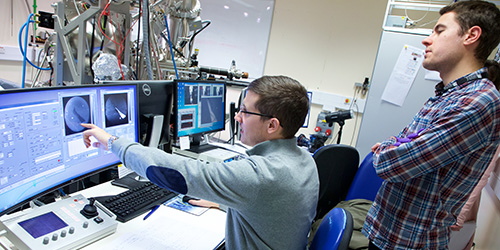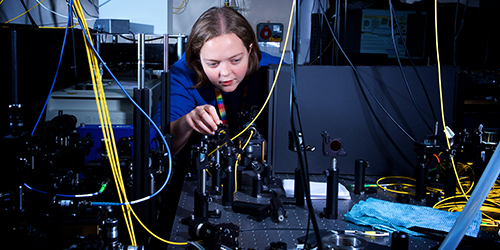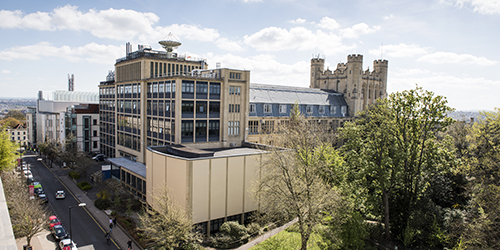Physics with Computing
Combine the latest ideas in physics with cutting-edge techniques in computing in our world-class physics department.
Highly ranked
Bristol is ranked in the UK top five for Physics research (THE analysis of REF 2021).
Apply your knowledge
Gain expertise and practical skills in programming, data science, machine learning and more alongside innovative and research-intensive physics teaching.
Friendly community
Chaos, our vibrant and award-winning physics society, organises social and educational activities, trips, and a 'parenting' scheme to help new students feel welcome.
Physics with Computing courses for 2025
Single Honours
Physics with Computing at Bristol
Computing skills are essential in all areas of physics, whether experimental or theoretical. Computers control advanced instrumentation, and computer simulations make predictions from the properties of sub-atomic particles to the formation of stars and galaxies.
Scientific computing is an interdisciplinary field that uses computer science, data science and digital technology for state-of-the-art scientific problem-solving. To study this subject you do not need any prior computing experience.
You will be taught by experts in both physics and computing drawn from every research area of the School of Physics, as well as computing experts from across the Faculty of Science.
You'll also have the opportunity to join Chaos, the nation's best student society (National Societies Awards 2019), to get the most out of your time at Bristol.
We also offer Physics.
Think Big bursaries of £3,000 are available to support first-year international undergraduate students in this subject area.
Bristol is unique in its ability to be a place where you are accepted for every aspect of yourself, students are uplifted and motivated by the amazing staff and students around all the time, and you are always put to the challenge of pushing yourself to do your best.
Career prospects

Graduates of these degrees are well placed to follow careers in a diverse range of areas, from physics research to computing and data science.
These courses address the demand for skilled practitioners in research and industry by developing strong computing skills with a solid foundation in physics and, above all, an understanding of how to combine these areas to best effect.
We work closely with our Industrial Advisory Board to understand the needs of industry and shape our courses to boost our graduates' employability. Our curriculum is designed to help you develop important scientific and technical skills including coding and data analysis combined with transferable skills such as problem-solving, presenting, communicating, numeracy, creativity and resilience.
Career opportunities may include:
- scientific research
- chemical industry
- engineering industry
- computing
- data science
- finance.
Course structure

You will gain a comprehensive grounding in classical and quantum physics and will develop the mathematical and computational skills needed to solve problems ranging from the quantum realm to galaxy formation.
Our Physics with Computing courses cover the same core content as other Physics degrees, but they also have a significant emphasis on computing.
We will introduce you to:
- coding
- data analysis and visualisation
- high-performance computing
- machine learning
- modern hardware and computing methods
- programming
- software engineering
- virtual/augmented reality.
You will have plenty of opportunities to apply this knowledge to problems in physics.
For those wanting to gain more applied computing experience during their degree, we offer an MSci degree with industrial experience.
Advanced facilities

Physics is based at the heart of our campus in the beautiful environment of Green Flag Award-winning gardens. Within the Gothic architecture of our Grade II-listed Physics building are exceptional modern facilities, including state-of-the-art teaching labs, a dedicated physics library and a six-metre radio telescope.
Our student spaces also include Physbar, an entirely student-run caf� provided by Chaos, our award-winning physics society. Bristol is also home to the pioneering Centre for Nanoscience and Quantum Information.